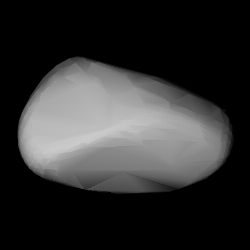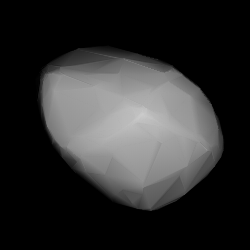Caprera is a minor planet orbiting the Sun.
Seppina is a minor planet orbiting the Sun.
Laodica is a minor planet orbiting the Sun.

Iolanda is a minor planet orbiting the Sun.
Mabella is a minor planet orbiting the Sun.

Halawe is a minor planet orbiting the Sun. It is named after the Middle Eastern confectionery halva.

Sara is a minor planet orbiting the Sun.

Nassovia is a minor planet orbiting the Sun. It is a member of the Koronis family of asteroids.
Pauly is a minor planet orbiting the Sun.

Charlotte is a minor planet orbiting the Sun. It was discovered by Paul Götz on September 11, 1904, in Heidelberg.
Misa is a minor planet orbiting the Sun.
Klotilde is a minor planet orbiting the Sun.
Bandusia is a minor planet orbiting the Sun.

Musa is a minor planet orbiting the Sun.
Luisa is a minor planet orbiting the Sun.
625 Xenia is a minor planet orbiting the Sun. It was discovered by August Kopff in Heidelberg, Germany, on 11 February 1907. The name may have been inspired by the asteroid's provisional designation 1907 XN.
635 Vundtia is a minor planet orbiting the Sun - though this claim has been disputed.
733 Mocia is a minor planet orbiting the Sun. A possible occultation was observed by Oscar Canales Moreno on October 1, 2001.
6144 Kondojiro (1994 EQ3) is an asteroid discovered on March 14, 1994 by Kin Endate and Kazuro Watanabe at the Kitami Observatory in eastern Hokkaidō, Japan. It is named after Jiro Kondo, a Japanese Egyptologist and professor of archaeology at Waseda University.
2021 LL37 is a large trans-Neptunian object in the scattered disc, around 600 kilometres (370 miles) in diameter. It was discovered on 12 June 2021, by American astronomers Scott Sheppard and Chad Trujillo using Cerro Tololo Inter-American Observatory's Dark Energy Camera in Chile, and announced on 31 May 2022. It was 73.9 astronomical units from the Sun when it was discovered, making it one of the most distant known Solar System objects from the Sun as of May 2022. It has been identified in precovery images from as far back as 28 April 2014.






